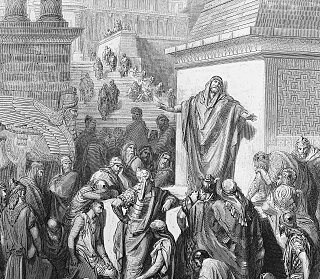God’s Will For You Is Not Always The Easy Path
 There was nothing unusual about Jonah receiving a word from the Lord. He likely received dozens, if not hundreds, of messages from God during his prophetic ministry in Israel. The trouble was, one one particular day, the message he received was nothing like he had ever heard before.
There was nothing unusual about Jonah receiving a word from the Lord. He likely received dozens, if not hundreds, of messages from God during his prophetic ministry in Israel. The trouble was, one one particular day, the message he received was nothing like he had ever heard before.
God told Jonah in Jonah 1:2, “Arise, go to Nineveh, that great city, and call out against it, for their evil has come up before me.”
“Their evil has come up before me” is a Hebrew expression that literally refers to bad-smelling odor. In English we often say it this way: “Something stinks to the highest heaven.”
God essentially tells Jonah here, “The stench of the sins of Nineveh has reached Me in heaven, and I want you to go warn them that I have noticed their sins and will not let them go unpunished.”
God’s prophets were accustomed to delivering unpopular messages. Jonah likely delivered scathing judgment in the throne rooms of kings and throughout cities in Israel. But something about this calling was different. He was being sent to a mission field. He was being sent to people who hated him, and whom he hated.
The very thought of going to Nineveh would have struck immense fear into the heart of any Jew. This capital city of Assyria was known for its brutality and unparalleled cruelty. Various historical records and excavations describe prisoners stretched out with ropes and then skinned alive; their eyes gouged out; hooks put through their noses so they could be led around the city like cattle before being executed.
One Assyrian king boasted about himself: “I flayed the skin from as many nobles as had rebelled against me and draped their skin over the pile of corpses. I burned their children. I captured many troops alive and cut off their arms and hands, noses, ears and extremities.”
Even the infamously cruel Roman Emperor Nero took ideas from the Assyrians, who impaled captives alive and set them on fire, just as Nero would do to Christians as he used them as human torches, providng light for his evening garden parties.
Jonah, like many Jews of his day, would have been profoundly aware—and terrified—of this Ninevite reputation. Another prophet, Nahum, would later prophecy these words from God against Nineveh:
“Woe to the bloody city, all full of lies and plunder—no end to the prey! The crack of the whip, and rumble of the wheel, galloping horse and bounding chariot! Horsemen charging, flashing sword and glittering spear, hosts of slain, heaps of corpses, dead bodies without end—they stumble over the bodies! . . . Behold, I am against you, declares the LORD of hosts” (Nahum 3:1-5).
I often wonder if we would be as quick to judge Jonah for his response to God’s calling if we had a proper historical understanding of the nation God was commanding Jonah to reach.
The will of God for Jonah did not announce a contingency plan for his physical safety, and God’s will for us doesn’t guarantee our safety either. Our brothers and sisters in China, North Korea, and Afghanistan understand the realities of these threats in their daily lives.
Let’s be clear, God’s call to Jonah was to perform something emotionally and physically impossible. It makes me wonder: what impossible task has God assigned you today? What kind of safety—to your reputation, your lifestyle, your life—are you worried about that may hinder your full cooperation in obeying God’s calling in your life?
Let’s learn from Jonah’s dilemma that God’s will for us isn’t always the easy path; sometimes it might be incredibly difficult; but God’s will is always the right path to take. As Andrew Murray often said during dangerous and difficult pastoral duties in South Africa a century ago, “The safest place to be is in God’s service.”
If you want to explore Jonah in more detail, Stephen's book is available here.

Add a Comment